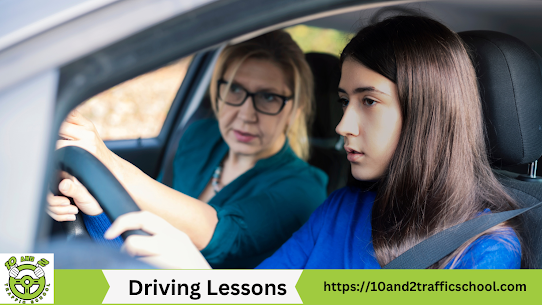Teen driving can be a stressful and anxious time for parents. It’s natural to worry about your child’s safety on the road, especially when they’re just starting out. However, studies show that parental involvement in teen driving lessons is crucial to ensuring their success and safety behind the wheel. In this blog post, we will dive into the importance of parental involvement in teen driving lessons and how it can make a significant impact on your child’s overall driving experience. We will also discuss different strategies that parents can use to increase their involvement in both supervised and independent teen driving, as well as how to evaluate the success of these efforts. So, let’s get started and learn how you can help your teen become a safe and confident driver.
Understanding the Importance of Parental Involvement in Teen Driving Lessons
Parental involvement is crucial when it comes to ensuring the safety of teen drivers. Parents play a significant role in teaching their teens safe driving skills and instilling good driving habits. Active parental involvement has been shown to reduce risky behaviors in teen drivers, such as speeding or distracted driving.
During driving lessons, parental support is paramount. Parents who actively participate in their teen’s driving education can help improve their driving skills and build their confidence behind the wheel.
The Novice Young Driver Problem
Novice teen drivers face a range of unique challenges on the road. Their inexperience puts them at a higher risk of crashes compared to more seasoned drivers. The lack of driving practice contributes significantly to these novice driver crashes. However, parental involvement can play a crucial role in helping these young drivers navigate risky conditions and improve their safety on the road.
Professional training combined with parental support enhances the safety of novice teen drivers. By providing a solid foundation of driver training, teens gain the necessary skills and knowledge to handle various driving situations. With parental guidance, they receive valuable insights into the most dangerous driving conditions and how to mitigate the risks associated with them.
Research conducted by the National Institute of Child Health and Human Development shows that parental involvement, including setting limits and providing supervision, is one of the most important factors in reducing crash rates among teenage drivers. Studies have demonstrated that the provisions of Graduated Driver Licensing (GDL) programs, which include supervised driving and parental limit setting, have substantial positive safety effects.
Observational studies conducted in different states, such as New Jersey in the United States, have shown that teens who have a wide range of behind-the-wheel instruction and substantial independent driving experience under supervision are less likely to be involved in crashes. The effectiveness of GDL provisions, coupled with parental involvement, helps to ensure that young drivers gain the necessary experience and confidence to navigate the roads safely.
The Effectiveness of Supervised Practice Driving
Supervised practice driving with parental involvement is crucial for the development of teen drivers. It not only provides important road safety experience, but also strengthens their driving skills. Through these sessions, teens gain valuable experience behind the wheel, enhancing their driving skills and preparing them for independent driving. With increased frequency of practice sessions, teens can further improve their performance and become more confident drivers. By offering guidance and feedback, parents become an essential part of their teens’ driving journey, instilling safe driving habits early on and promoting responsible behavior on the road.
Impact of Parent Supervised Practice Driving
Parental involvement is crucial in reducing crash risk for teen drivers during practice driving sessions. Studies conducted by the National Institute of Child Health and Human Development have shown that teens who practice driving with their parents are more likely to adhere to the rules of the road, creating safer driving conditions for themselves and others. The Children’s Hospital of Philadelphia and the University of Pennsylvania have also emphasized the role of parents in strengthening teen driving skills. The effectiveness of parent-supervised practice driving is further enhanced through the implementation of Graduated Driver Licensing (GDL) provisions, such as the Checkpoints program in New Jersey, which gives parents a framework to guide their teen’s driving progress. Overall, parental involvement plays a vital role in helping teens become experienced and skilled drivers.
Process and Challenges
The process of parent-supervised practice driving can be challenging for both teenagers and their parents. However, parental involvement is crucial for the development of safe driving skills. Effective parental support involves setting limits and house rules, clear communication, and control during practice sessions. With parental guidance, teens can overcome the challenges of practice driving and gain independent driving experience. This experience is essential for developing the skills and confidence needed to navigate various driving scenarios, such as night driving and driving with teen passengers. Ultimately, parental involvement plays a vital role in promoting teen driver safety.
Research conducted by organizations like the National Institute of Child Health and Human Development has shown that parent limit-setting and little support during practice driving can lead to increased safety effects for inexperienced drivers. The Graduated Driver Licensing (GDL) provisions, such as learner’s permits and supervised driving, aim to address these challenges and provide a structured framework for teen driver training.
 What Role do Parents Play in Independent Teen Driving?
What Role do Parents Play in Independent Teen Driving?
Parents play a crucial role in independent teen driving. They continue to influence their teens’ safety on the road by providing support, acting as role models for safe driving behaviors, and ensuring that traffic safety rules are followed independently. Active parental involvement and guidance enhance teen driver safety during independent driving.
How to Increase Parental Management of Novice Teen Drivers?
Strategies to enhance parental involvement in supervised practice driving are crucial. Strengthening teen driver skills through increased parental support during practice sessions is essential. Educating parents about the importance of involvement in teen driving lessons boosts their ability to manage novice teen drivers. Parental involvement training programs improve parent engagement in teen driver education. Collaborative efforts between parents, driving schools, and policymakers are key to increasing parental management of novice teen drivers.
Strategies to Enhance Parent Involvement in Supervised Practice Driving
To enhance parent involvement in supervised practice driving, it is crucial to provide parents with resources that can support their efforts. One effective strategy is to offer driving practice plans that outline specific goals and activities for each session. This not only gives parents a clear roadmap but also encourages their active participation in the process.
Methods to Boost Parental Management of Independent Teen Driving
Parental involvement is key in helping teens become safe and responsible drivers. By implementing parent-teen driving agreements and using technology, such as parental control apps, parents can effectively manage their teen’s behavior on the road. Parental involvement programs also offer support and resources to parents, equipping them with the knowledge and tools they need to guide their teens. By working together, parents and teens can create a safe and positive driving experience for everyone on the road.
Evaluating the Success of Parental Involvement in Teen Driving Lessons
Assessing the impact of parental involvement on teen driving safety is essential. Numerous studies have demonstrated that when parents actively participate in their teen’s driving education, it leads to significant effects on teen driver safety. This emphasizes the importance of evaluating the success of parent involvement programs to inform policy innovation in this area. Research has consistently highlighted the pivotal role parents play in reducing teen motor vehicle crashes.
Understanding the effects of parental involvement can help improve teen driver education programs by incorporating effective strategies. By evaluating the success of these programs, policymakers and educators can identify which approaches are most effective in promoting safe driving behaviors among teenagers. The National Institute of Child Health and Human Development conducted a wide range of observational studies to examine the safety effects of various parent involvement strategies.
By evaluating the success of parental involvement, researchers can identify the most important factors that contribute to safe driving practices among teens. Factors such as parent limit-setting, providing support and resources, and offering regular feedback sessions have been found to positively impact novice teenage drivers. Additionally, understanding the success of parental involvement programs can inform the development of comprehensive strategies that address the most dangerous driving conditions for teenagers, such as night driving and driving with teen passengers.
Efficacy and Effectiveness
Parental involvement in teen driving lessons has proven to be highly effective in enhancing the overall efficacy of driver education programs. By actively participating in their teens’ driving journey, parents can reinforce safe driving habits and provide additional behind-the-wheel practice, giving their teens valuable experience and exposure to various driving scenarios. This not only helps improve their skills but also reduces risky driving behaviors and the occurrence of accidents among teens.
Effective communication between parents and teens is key in establishing expectations and guidelines for safe driving. By openly discussing topics such as driver licensing, night driving, and the dangers of distracted driving, parents can instill a strong sense of responsibility and awareness in their teenage drivers.
Conclusion
Parental involvement plays a crucial role in ensuring the safety and development of teen drivers. Supervised practice driving allows parents to guide their teens and instill good driving habits from the start. By actively participating in their teen’s driving lessons, parents can reduce the risk of accidents and promote responsible driving behaviors. Additionally, ongoing parental management during independent driving is essential for maintaining safe driving practices. Strategies such as setting clear expectations, establishing communication channels, and using technology tools can help parents effectively monitor and support their teen’s driving progress. Ultimately, the success of parental involvement in teen driving lessons is measured by the development of safe and confident young drivers on the road.


